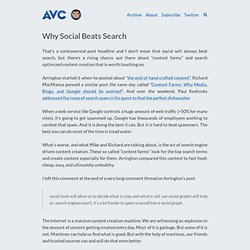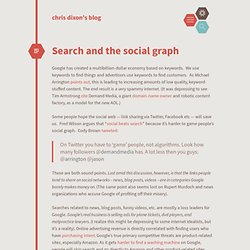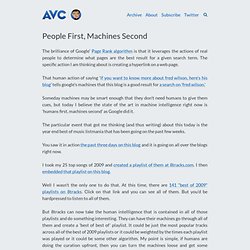

The End Of Hand Crafted Content. Old media loves nothing quite so much as writing about their own impending death.

And we always enjoy adding our own two cents – the AP not knowing what YouTube is, the NYTimes guys reading TechCrunch every day, etc. Speaking broadly, I like what Reuters, Rupert Murdoch and Eric Schmidt are saying: the industry is in crisis, and the daring innovators will prevail. Personally, I still think the best way forward for the best journalists, if not the brands they currently work for, is to leave those brands and do their own thing. But as one of the innovators in the last go round, I think there’s a much bigger problem lurking on the horizon than a bunch of blogs and aggregators disrupting old media business models that needed disrupting anyway. The rise of fast food content is upon us, and it’s going to get ugly. Old media frets over blogs and aggregators that summarize content and link back to the original source. But even then, companies like ours can find a way to compete.
Dishwashers, and How Google Eats Its Own Tail. Cody Brown: On Twitter you have to 'ga... Why Social Beats Search. That's a controversial post headline and I don't mean that social will always beat search, but there's a rising chorus out there about "content farms" and search optimized content creation that is worth touching on.

Arrington started it when he posted about "the end of hand crafted content". Richard MacManus penned a similar post the same day called "Content Farms: Why Media, Blogs, and Google should be worried". And over the weekend, Paul Kedrosky addressed the issue of search spam in his quest to find the perfect dishwasher. When a web service like Google controls a huge amount of web traffic (>50% for many sites), it's going to get spammed up. Google has thousands of employees working to combat that spam. Search and the social graph cdixon.org – chris dixon's blog. Google has created a multibillion-dollar economy based on keywords.

We use keywords to find things and advertisers use keywords to find customers. As Michael Arrington points out, this is leading to increasing amounts of low quality, keyword-stuffed content. The end result is a very spammy internet. (It was depressing to see Tim Armstrong cite Demand Media, a giant domain-name owner and robotic content factory, as a model for the new AOL.) Some people hope the social web — link sharing via Twitter, Facebook etc — will save us. On Twitter you have to ‘game’ people, not algorithms. These are both sound points. Searches related to news, blog posts, funny videos, etc. are mostly a loss leaders for Google. This is not to say that the links shared on social networks can’t be extremely valuable. Content Farms: Why Media, Blogs & Google Should Be Worried. I've been writing a lot about so-called 'content farms' in recent months - companies like Demand Media and Answers.com which create thousands of pieces of content per day and are making a big impact on the Web.

Both of those two companies are now firmly inside the top 20 Web properties in the U.S., on a par with the likes of Apple and AOL. Big media, blogs and Google are all beginning to take notice. Chris Ahearn, President of Media at Thomson Reuters, recently published an article on how journalism can survive in the Internet age. TechCrunch founder Michael Arrington also riffs on this theme, mentioning AOL's "Toyota Strategy of building thousand of niche content sites via the work of cast-offs from old media" and quoting a Wired piece on Demand Media from October. I started my analysis of Demand Media in this August post. In November I explored more about how Demand Media produces 4,000 pieces of content a day, based on an interview I did with the founders in September. People First, Machines Second. The brilliance of Google' Page Rank algorithm is that it leverages the actions of real people to determine what pages are the best result for a given search term.

The specific action I am thinking about is creating a hyperlink on a web page. That human action of saying 'if you want to know more about fred wilson, here's his blog' tells google's machines that this blog is a good result for a search on 'fred wilson.' Someday machines may be smart enough that they don't need humans to give them cues, but today I believe the state of the art in machine intelligence right now is 'humans first, machines second' as Google did it. The particular event that got me thinking (and thus writing) about this today is the year end best of music listmania that has been going on the past few weeks. You saw it in action the past three days on this blog and it is going on all over the blogs right now. Curation. Web curation trend.